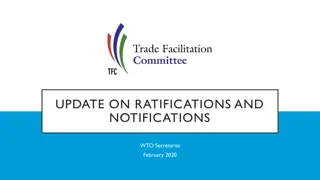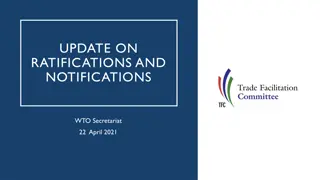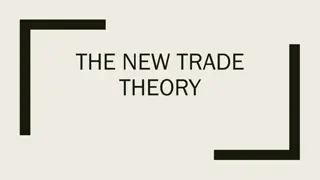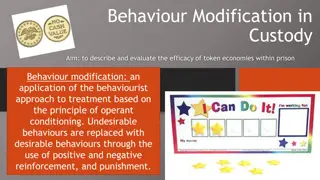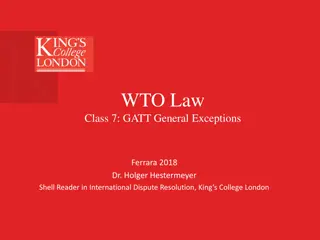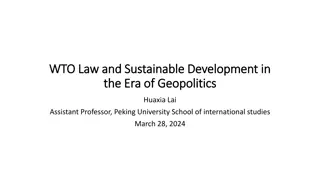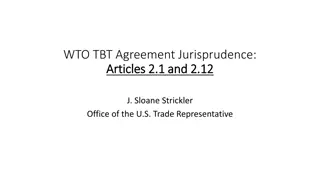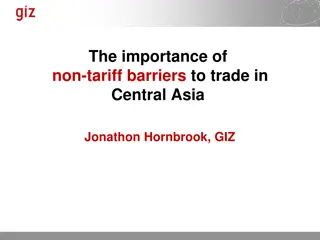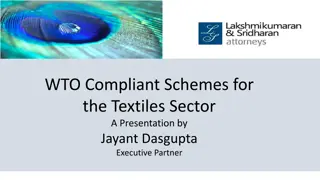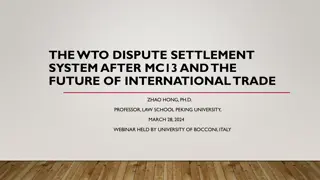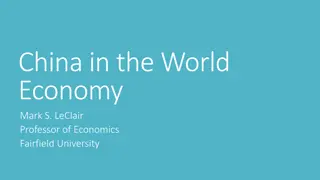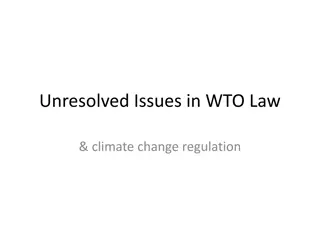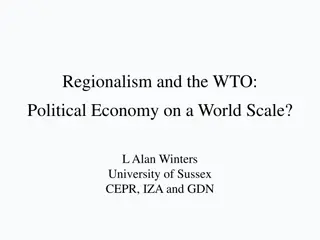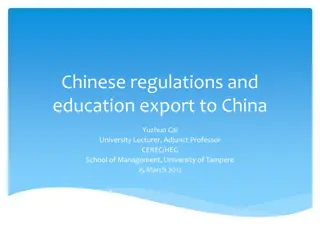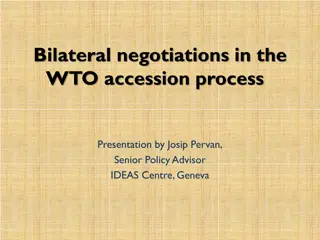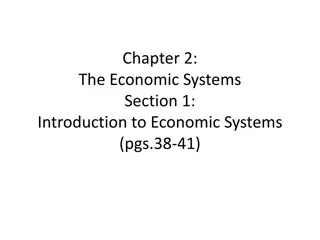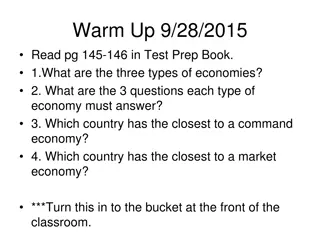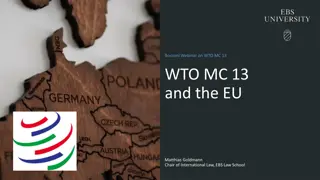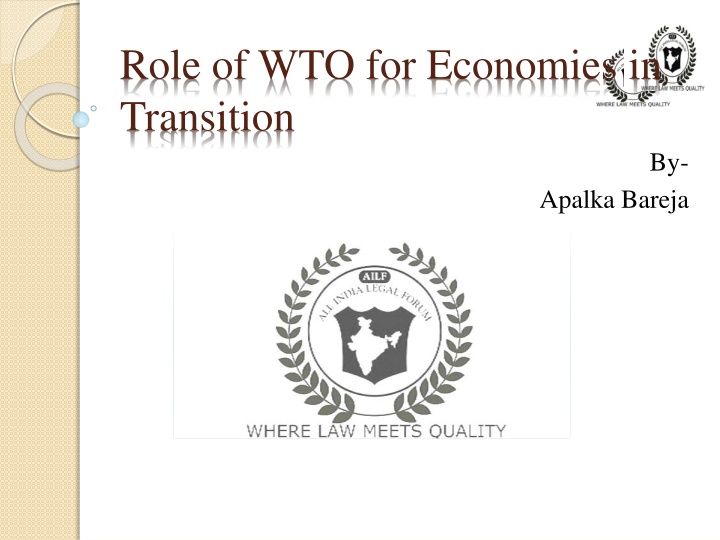
Role of WTO in Transition Economies
The World Trade Organization (WTO) plays a crucial role in facilitating trade and negotiations, especially for economies in transition. Transition economies face challenges like unemployment, inflation, lack of infrastructure, and corruption. The WTO assists developing and transition economies through special provisions, differential treatment, and increased market access opportunities. The Committee on Trade and Development within the WTO focuses on supporting the trade needs of developing countries.
Download Presentation

Please find below an Image/Link to download the presentation.
The content on the website is provided AS IS for your information and personal use only. It may not be sold, licensed, or shared on other websites without obtaining consent from the author. If you encounter any issues during the download, it is possible that the publisher has removed the file from their server.
You are allowed to download the files provided on this website for personal or commercial use, subject to the condition that they are used lawfully. All files are the property of their respective owners.
The content on the website is provided AS IS for your information and personal use only. It may not be sold, licensed, or shared on other websites without obtaining consent from the author.
E N D
Presentation Transcript
Role of WTO for Economies in Transition By- Apalka Bareja
The World Trade Organization (WTO) is one of the three international organisations (the other two are the International Monetary Fund and the World Bank Group) which by and large formulate and co-ordinate world economic policy. WTO s main functions are to do with trade and negotiations and the enforcement of negotiated multilateral trade rules.
CONTI WTO deals with the special needs of an increasingly important group, i.e. developing countries and economies in transition. ECONOMIES IN TRANSITION: A transition economy is one that is changing from central planning to free markets.
PROBLEMS OF TRANSITION ECONOMIES Rising Unemployment Rising inflation Lack of entrepreneurship and skills Corruption Lack of infrastructure Lack of a sophisticated legal system Moral hazard
Assisting Developing and Transition Economies About two thirds of the WTO s around 150 members are developing countries. The WTO deals with the special needs of the developing countries in three ways :- The WTO agreements contains Special Provisions on developing countries. The WTO agreements include numerous provisions giving developing and least developed countries special rights or extra leniency- special and differential treatment . GATT, which deals with trade in goods has a special section (part4) on trade and development which includes provisions on the concept of non reciprocity in trade negotiation between developed and developing countries. Extra time for developing countries to fulfil their commitments Provisions designed to increase developing countries trading opportunities through greater market access eg- textiles, technical barriers to trade. Provisions requiring WTO members to safeguard the interests of developing countries when adopting some domestic or international measures eg- in anti dumping.
2.The Committee on Trade and Development is the main body focusing on work in this area in the WTO, with some others dealing with specific topics such as trad and debt, and technology transfer. Trade and Development committee The WTO committee on trade and development has a wide ranging mandate its priorities are : how provisions favouring developing countries are being implemented, guidelines for technical cooperation, increased participation of developing countries in the trading system, and the position of least developed countries. The Trade and Development Committee handles notifications of: Generalized System of Preferences programmes (in which developed countries lower their trade barriers preferentially for products from developing countries) preferential arrangements among developing countries such as MERCOSUR (the Southern Common Market in Latin America), the Common Market for Eastern and Southern Africa (COMESA), and the ASEAN Free Trade Area (AFTA).
b) Sub- committee on least developed countries Its work focuses on two related issues: ways of integrating least-developed countries into the multilateral trading system technical cooperation. The sub-committee also examines periodically how special provisions favouring least-developed countries in the WTO agreements are being implemented. c) The Doha agenda committees The Doha Ministerial Conference in November 2001, added new tasks and some new working groups. The Trade and Development Committee meets in special sessions to handle work under the Doha Development Agenda. The ministers also set up working groups on Trade, Debt and Finance, and on Trade and Technology Transfer
3. the WTO Secretariat provides technical assistance (mainly training of various kinds) for developing countries. Technical cooperation is an area of WTO work that is devoted almost entirely to helping developing countries (and countries in transition from centrally-planned economies) operate successfully in the multilateral trading system. The objective is to help build the necessary institutions and to train officials. The subjects covered deal both with trade policies and with effective negotiation. Training, seminars and workshops The WTO holds regular training sessions on trade policy in Geneva. In addition, it organizes about 500 technical cooperation activities annually, including seminars and workshops in various countries and courses in Geneva.
Specialized help for Exporting To provide specialized help to the developing countries (as requested by them) in 1964, GATT has established an International Trade Centre (ITC). Originally created by the General Agreement on Tariffs and Trade (GATT) in 1964, ITC has been operated since 1968, as the joint cooperation agency of GATT/WTO and the UN, the latter acting through the United Nations Conference on Trade and Development (UNCTAD) for business aspects of trade development. It is the focal point in the UN system for technical cooperation with developing countries and economies in transition in trade promotion and export development. The headquarter of the ITC is situated in Geneva, Switzerland. The function of the centre is to respond whenever a request is made by developing countries for assistance in formulating and implementing export and import operations and techniques (by giving important and beneficial advice and information on export markets and the techniques of marketing) to become more competitive in global markets, speeding economic development and contributing to the achievement of the United Nations Millennium Development Goals.
The International Trade Centre (ITC) is the only development agency that is fully dedicated to supporting the internationalization of small and medium-sized enterprises (SMEs) and enables SMEs in developing and transition economies to become more competitive and connect to international markets for trade and investment, thus raising incomes and creating job opportunities, especially for women, young people, and poor communities. ITC also assists in providing training to personnels required for export, promotion and marketing services. The centre provides all the facilities and services free to the least developed countries. ITC MISSION ITC's mission is to foster inclusive and sustainable economic development, and contribute to achieving the United Nations Global Goals for Sustainable Development. ITC works towards creating trade impact for good . Through its work, the ITC contributes directly to 10 of the Sustainable Development Goals. These include SDG 1 (no poverty), Goal 2 (zero hunger), Goal 4 (Quality Education), Goal 5 (Gender Equality), Goal 8 (Decent Work and Economic Growth), Goal 9 (Industry, innovation and infrastructure), Goal 10 (Reduced Inequalities), Goal 12 (Responsible Production and Consumption), Goal 16 (Peace, Justice and strong institutions), and Goal 17 (Partnerships for the Goals).
ITC STRUCTURE ITC is headed by an Executive Director, who reports to the Secretary-General of the United Nations Conference on Trade and Development (UNCTAD) and the Director-General of the World Trade Organization (WTO). The Senior Management Committee (SMC) is made up of two executive officers and the heads of ITC s four divisions. Internally, the organization is structured into the offices of the Executive Director and the Deputy Executive Director, and four divisions with Divisional Directors at the head. ITC GOALS Strengthening the integration of the business sector of developing countries and economies in transition into the global economy. Improving the performance of trade and investment support institutions for the benefit of SMEs. And enhancing the abilities of trade support institutions to better support them Improving the international competitiveness of SMEs. ITC PRIORITY COUNTRIES ITC prioritizes project implementation in Least Developed Countries, Land-locked Developing Countries, Small Island Developing States, Sub-Saharan Africa, SVEs, post conflict and fragile states. ITC has committed to spending at least 80% of its country-level assistance in these priority countries.
ITC's SIX FOCUS AREAS ITC delivers integrated solutions around a core set of six focus areas representing a set of interventions with corresponding programmes that are adapted and customized into client-focused solutions- Providing Trade and Market Intelligence Building a Conducive Business Environment Strengthening Trade and Investment Support Institutions Connecting to International Value Chains Promoting and Mainstreaming Inclusive and Green Trade Supporting Regional Economic Integration and South-South Links ITC FUNDERS ITC collaborates with a range of partners, funders and the private sector to deliver transformative interventions. In addition to contributions from governments, ITC is supported by regional associations, regional banks, the private sector, non-governmental organizations and international organizations. ITC DURING THE CRISIS OF COVID-19 ITC welcomes the pledge of G-20 economies to inject $5 Trillion in global economy along with particular focus on the flow of vital medical supplies across borders. Providing with different projects and programs (remote training and workshop facility, She Trade Initiatives and Trade and Market intelligence tools).
Cooperation in global economic policy- making An important aspect of the WTO s mandate is to cooperate with the International Monetary Fund, the World Bank and other multilateral institutions to achieve greater coherence in global economic policy-making. A separate Ministerial Declaration was adopted at the Marrakesh Ministerial Meeting in April 1994 to underscore this objective. The declaration envisages an increased contribution by the WTO to achieving greater coherence in global economic policy-making. It recognizes that different aspects of economic policy are linked, and it calls on the WTO to develop its cooperation with the international organizations responsible for monetary and financial matters the World Bank and the International Monetary Fund.
Marrakesh Declaration of 15 April 1994 Ministers affirm that the establishment of the World Trade Organization (WTO) ushers in a new era of global economic cooperation, reflecting the widespread desire to operate in a fairer and more open multilateral trading system for the benefit and welfare of their peoples. Ministers express their determination to resist protectionist pressures of all kinds. They believe that the trade liberalization and strengthened rules achieved in the Uruguay Round will lead to a progressively more open world trading environment. Ministers undertake, with immediate effect and until the entry into force of the WTO, not to take any trade measures that would undermine or adversely affect the results of the Uruguay Round negotiations or their implementation. Ministers confirm their resolution to strive for greater global coherence of policies in the fields of trade, money and finance, including cooperation between the WTO, the IMF and the World Bank for that purpose.
Various ongoing cooperation: Trade policy cooperation and coordination are more than ever of utmost important. Digital technologies are a promising new trend giving rise to huge growth potential as well as challenges. Effective multilateralism is more important than ever. Addressing climate change and protecting limited natural resources are urgent and important issues on our policy agendas
Various facets of cooperation in light of economic policy: Constants in a changing world - Considered as core challenges to the international monetary system, facilitating external adjustment; ensuring an equitable burden of adjustment between surplus and deficit countries. Misaligned incentives - Countries act together when they are scared together. Coordination is, however, much harder when it involves governments implementing quite different policies from those they would have chosen on their own, and that make sense only if all parties deliver on their respective
Net and gross Cooperation have been when imbalances in net flows have occurred, therefore resulting into exchange rate misalignments. Stretching the truth - Beyond genuine uncertainty, a major obstacle to coordination has often been deliberate disagreements about cross-border multipliers. Unbiased analysis of domestic and cross-border effects of policies from a respected third party a neutral assessor might help to build consensus and achieve more cooperative outcomes.
Transparency Measures: Routine Notifications 1. Keeping WTO informed Nations to promptly inform WTO of relevant actions taken Many WTO Agreements informing the WTO new/modified trade measures Examples: details of technical standards, new countervailing/anti-dumping legislations, laws regarding intellectual property agreements mandate Secretariat of
Contd. Special groups are also established to examine new free-trade arrangements and the trade policies of countries joining as new members.
2. Keeping the public informed News of the latest developments are published daily on WTO s official website 18 July 1996: General Council agrees to open more information about WTO activities to public, put de-restricted documents online. 14 May 2002: GC decides to make restricted documents available after 2 months (previously 6 months) WTO Secretariat also engages with NGOs,
Engagement with NGOs No. of briefings for NGOs increased in 2002 by WTO Secretariat NGOs regularly invited to the WTO to present their policy research and analysis directly to member governments. Monthly list of NGO position papers received by the Secretariat is compiled and circulated for member governments. Monthly electronic news bulletin also available to NGOs, giving access to publicly available WTO information.

